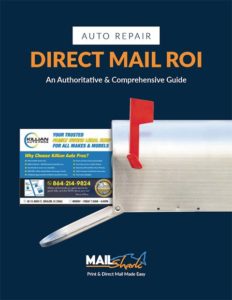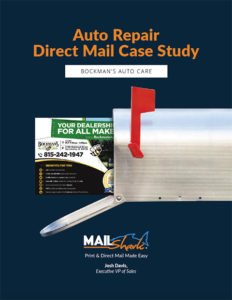EBook & Interactive Calculator Auto Repair Direct Mail ROI
Our powerful Auto Repair Direct Mail ROI calculator gives you the ability to calculate the real value of your customers and forecast the potential short-term ROI & long-term ROI that direct mail can produce based on your shop’s exact numbers. If you haven’t already done so, we recommend reading our Comprehensive Guide to Auto Repair Direct Mail ROI as well as our Bockman’s Auto Care Case Study. This will give you a complete understanding of the methodology used in our calculations.
**It’s important to note, the numbers discussed here are to educate auto repair shop owners on how direct mail works and allow you to quickly and accurately forecast the potential return that direct mail can generate for your shop. For those shops that are currently using direct mail, there is a different method used to calculate your actual ROI. This is done by executing a database match back report.
Instructions
Please choose the type of shop you operate:
Determine Value Of Your Customers
We start by uncovering the real value of each new customer you acquire.
It's important you do not value your new customers solely on the amount spent on their first repair order. You would be overlooking the important, ongoing revenue from future repair orders that can only come over time.
Therefore, you must identify and assign the real value and revenue that each customer spends while they remain a customer at your shop (i.e., Customer Lifetime Value).
Customer Lifetime Value (LTV)
Every quality auto repair shop receives referrals from their happy customers. Referrals remain the primary lead source for many of the top shops in the country.
It’s important you determine the average number of referrals you receive from each of your new customers. These referrals can be other vehicles from family members, friends, neighbors, or colleagues.
Don't skip this step! Revenue generated from referrals must be part of the value of each new customer. You would not have received that referral without the initial direct mail that attracted that new customer who referred them to your shop.
Revenue From New Customer Referrals
Using your shop's numbers entered above, we can now forecast the potential Total Lifetime Value of each of your customers.
In other words, the total amount of potential revenue generated from each new customer over the timespan they remain a customer, plus the addition of the important revenue generated from these customer referrals.
Total Customer Lifetime Value (LTV)
Short-Term & Long-Term Return On Investment
We define Short term ROI as revenue that comes in from the beginning of your mailing through a 1-6+ month period after your last mailer was sent out. It’s important you remain patient and give your direct mail marketing time to work. Remember prospects that receive your direct mail today, might not have a broken car until months down the line. This is proven time and time again with call tracking and match back reporting.
Response Rate %A ½% is the targeted benchmark response rate. However, with the right creative, mailing list, CTA and strategy, this number can certainly be exceeded as well.
Keep in mind that you take dollars to the bank, not percentages. Therefore, you can get a lower response right such as ¼% and still have the campaign be quite successful based on the dollar amount repair orders and revenue generated.
Cost of a MailerThis is based on Mail Shark’s all-inclusive average price for a 5.5″ × 10.5″ Oversized Postcard and your mailing quantity selection in this calculator.
Short-Term Direct Mail ROI
The final step is to determine the potential long-term ROI that your direct mail can deliver. Calculating the potential Long-Term ROI will give you transparency to the real value and impact on revenue that these customers will generate over time.
Cost of a MailerThis is based on Mail Shark’s all-inclusive price for a 5.5″ × 10.5″ Oversized Postcard and your mailing quantity selection in this calculator.
Long-Term Direct Mail ROI
Disclaimer: We are not lawyers, CPAs, or licensed investment professionals in any matter. The content of this communication is for informational purposes only and not for the purpose of providing legal or accounting advice. You should contact the appropriate legal professional for any issue or problem.

